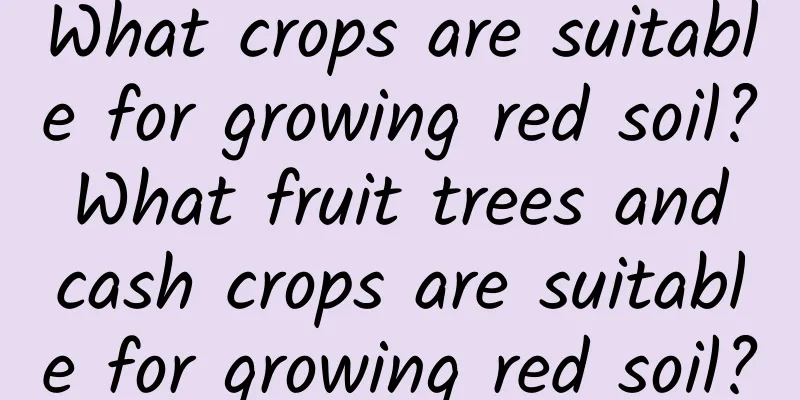What crops are suitable for growing red soil? What fruit trees and cash crops are suitable for growing red soil?

|
Because red soil contains very few mineral nutrients, is highly acidic, and is prone to producing poisons such as aluminum and manganese, red soil is suitable for growing plants that prefer slightly acidic conditions. It is generally suitable for growing economic crops such as tea, barley, wheat, navel oranges, mandarin oranges, and peaches. teaRed soil is rich in iron oxide, which makes the soil brown. However, red soil is highly acidic, so it can be used to grow tea, but the heavy clay content is a major disadvantage of red soil. Therefore, when planting tea, we can apply more organic fertilizers, apply appropriate amounts of lime, supplement phosphorus fertilizer, and improve the fertility of red soil to achieve good results and promote the growth of tea. Highland BarleyRed soil is suitable for growing highland barley, which requires soil with a relatively heavy viscosity. If the soil is not sticky enough, it will be very unfavorable for the growth of highland barley, and red soil just meets this requirement. When planting highland barley, apply more base fertilizer in the soil to make the soil rich in nutrients. And after highland barley absorbs the nutrients in the red soil, it will grow faster. wheatRed soil is suitable for growing wheat. Wheat has strong adaptability, is drought-resistant and cold-resistant, and does not have particularly high requirements for soil types. Red soil is relatively sticky, has strong fertilizer and water retention capabilities, has moderate soil tightness, and has relatively suitable pores. This type of soil is more conducive to the growth of wheat. Applying some fertilizer on red soil will make wheat grow faster. Navel OrangeAlthough red soil is indeed not suitable for growing vegetables, it is a godsend in the hands of fruit farmers who grow navel oranges. For example, the Ganzhou navel orange is made taste better because of the soil here. Ganzhou's unique red soil is, to be more precise, red soil made from weathered phyllite. Formed in the late geological movement, the soil layer is deep, with the deepest layer reaching more than one meter. In addition, the soil is loose and permeable, so the roots of the fruit trees can extend downwards well. Moreover, this red soil is rich in a variety of trace elements, giving Ganzhou navel oranges a unique flavor. WoganWalking into the Wogan planting base, the red soil is covered with Wogan saplings, full of vitality. Before the Wogan produces economic benefits, letting traditional crops create economic value first is the greatest value of the barren red soil. SpadesBlack peach can be grown in the black soil in northern my country, the red soil, and even the yellow soil in the west. It is less dependent on pesticides and requires less time for manual care. If you are a new fruit farmer who wants to grow fruit trees, you must try black peach. |
Recommend
Cultivation methods and precautions of Cynanchum tuberosum
Farming methods soil It likes loose, breathable, ...
The efficacy and function of coix seed
1. Medicinal Job's tears have the effects of ...
The secret of camellia care: how to care for the camellia you bought during the Chinese New Year
Placement We just bought camellia, and everyone t...
Pistachio planting conditions, temperature and climate requirements
Introduction to Pistachio Pistachio is a kind of ...
How to propagate water bamboo
Cuttings The best time for cutting propagation is...
Planting and management of peaches
1. Planting time Peaches need to be planted from ...
What fertilizer should be used to make the iron tree grow luxuriantly? The correct method of fertilization
It is best to fertilize the iron tree during its ...
Kidney bean cultivation methods and precautions
1. Maintenance methods 1. Temperature: It is rela...
How to get high yield when growing sweet potatoes?
Sweet potato, also known as sweet potato, is comm...
Motherwort planting time and method
Motherwort planting time Early-maturing motherwor...
How to grow and water Mo Lan in winter
1. Adequate sunlight It has relatively high requi...
How to fertilize ginger flower
Use of base fertilizer for ginger flower When cul...
How to Plant Mangosteen Seeds
1. Prepare the soil Planting mangosteen requires ...
What to do if the leaves of the spider plant are too long
1. Too much fertilization If there is sufficient ...
A novice plant grows flowers, and they die when they are told to. Why?
Water only to wet the surface of the pot If you a...









